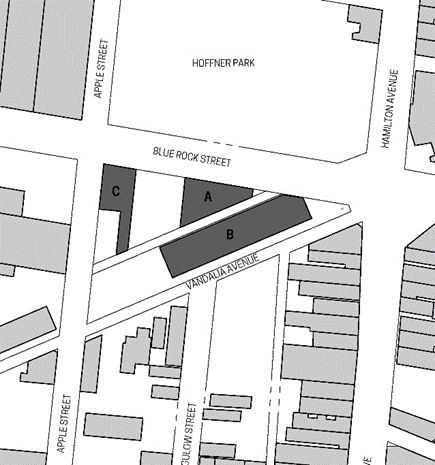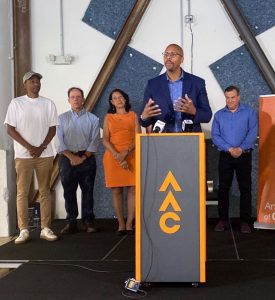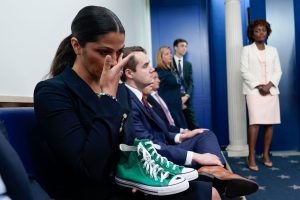House Democrats on Thursday delayed but eventually began debate on a newly negotiated package of policing bills, after scheduling a vote on the measures early on in the day with indications they had the support to pass.
The policing and safety bills came together weeks before the midterms and after months of long-fought negotiations. The package consists of four measures, including funding for smaller, local police departments.
The votes had been on the House schedule in the morning, before members left Washington for the weekend. Lawmakers only have three more voting days on the calendar before November’s midterm elections, since for most of October they’re scheduled to work in their districts.
A near three-hour delay came after Rep. Cori Bush, D-Mo., put out a statement saying she could not support the bill to boost local departments “without addressing the crisis of police brutality.” Other members of the progressive wing of the Democratic party were expected to follow.
Rep. Ayanna Pressley, D-Mass., ended up voting “present” on the rule to bring the bills up for debate, in order for them to get through. A “no” would have doomed the package.
House Speaker Nancy Pelosi said in a delayed press conference Thursday afternoon that the bills would get separate votes throughout the day.
The package includes reforms to ensure police funding is used to support smaller police departments, along with investments in de-escalation training and $250 million for mental health resources for officers. A major goal is to reduce fatal encounters between police and people with mental illness.
“We want to break the cycle of violence,” she said. “We, again, are very proud of the work that our members have done: Joyce Beatty, the chair of the Congressional Black Caucus, Josh Gottheimer, and many others who have worked together to bring this legislation to the floor.”
The breakthrough in negotiations over the policing bills came after intense negotiations in recent days between Rep. Josh Gottheimer, a New Jersey Democrat and leader of the centrist coalition, and Rep. Ilhan Omar D-Minn., one of the leaders of the progressive faction.
Joyce Beatty, chairwoman of the powerful Congressional Black Caucus, and Hakeem Jeffries, chairman of the Democratic caucus, facilitated a number of the conversations after it was clear in recent days that progress could be made.
“We have people who still won’t like this bill, and I respect that tremendously,” Beatty, an Ohio Democrat, told reporters shortly before the deal was announced. “And we have people who will say we move the needle by listening and working with everyone.”
Their deal, reached with little time to spare on the House calendar, could help unite the party on a public safety platform more than two years after the police killing of George Floyd.
“I’m proud to have worked closely with Republicans, Democrats, and a broad spectrum of stakeholders to make real progress for public safety,” Gottheimer said in a statement Wednesday.
To get the more liberal members on board, the final package also includes limited language around police accountability that would allow the Justice Department to have preferential consideration over which police departments are permitted to receive the grants. It will also allocate $50 million of the funding to go toward data collection on police practices and community safety.
The police funding package is modest in comparison to the bill that Democrats introduced in the weeks after Floyd’s death in the summer of 2020.
That sweeping package, which passed the House more than a year later, went much further as far as police accountability, including banning police chokeholds and altering so-called qualified immunity for law enforcement, which would make it easier to pursue claims of police misconduct.
The unprecedented effort by lawmakers to curb police violence was stalled in the Senate for weeks as Republicans tried to push forward a competing plan by Sen. Tim Scott, R-S.C., which would have diminished the use of chokeholds – not ban them – as well as increase federal reporting requirements for use of force and no-knock warrants. Senate Democrats blocked the plan, saying it did not go far enough to address racial inequality.
The new package, Gottheimer said, has gained the support and input of law enforcement groups like the National Association of Police Organization and the Fraternal Order of Police.
It is unclear if the bills will have any Republican support. Some quickly criticized the package.
“These are efforts to repair their image with voters who blame them for higher crime rates,” said Rep. Jim Banks, R-Ind., the chair of the Republican Study Committee. “The Democrats know that their anti-police rhetoric over the last few years has harmed them in key districts that they need to keep the majority, which they are not. This is a top-of-the-list item for voters.”
Rep. Steven Horsford, D-Nev., said he’s not betting on bipartisan support, given the GOP plans to make crime a focal point in the fall campaign.
“I’m not worried about the other side,” Horsford said. “I’m worried about saving lives and reducing crime and breaking the cycle of violence.”
“I lost my father to gun violence when I was 19, so it’s personal,” he said.




